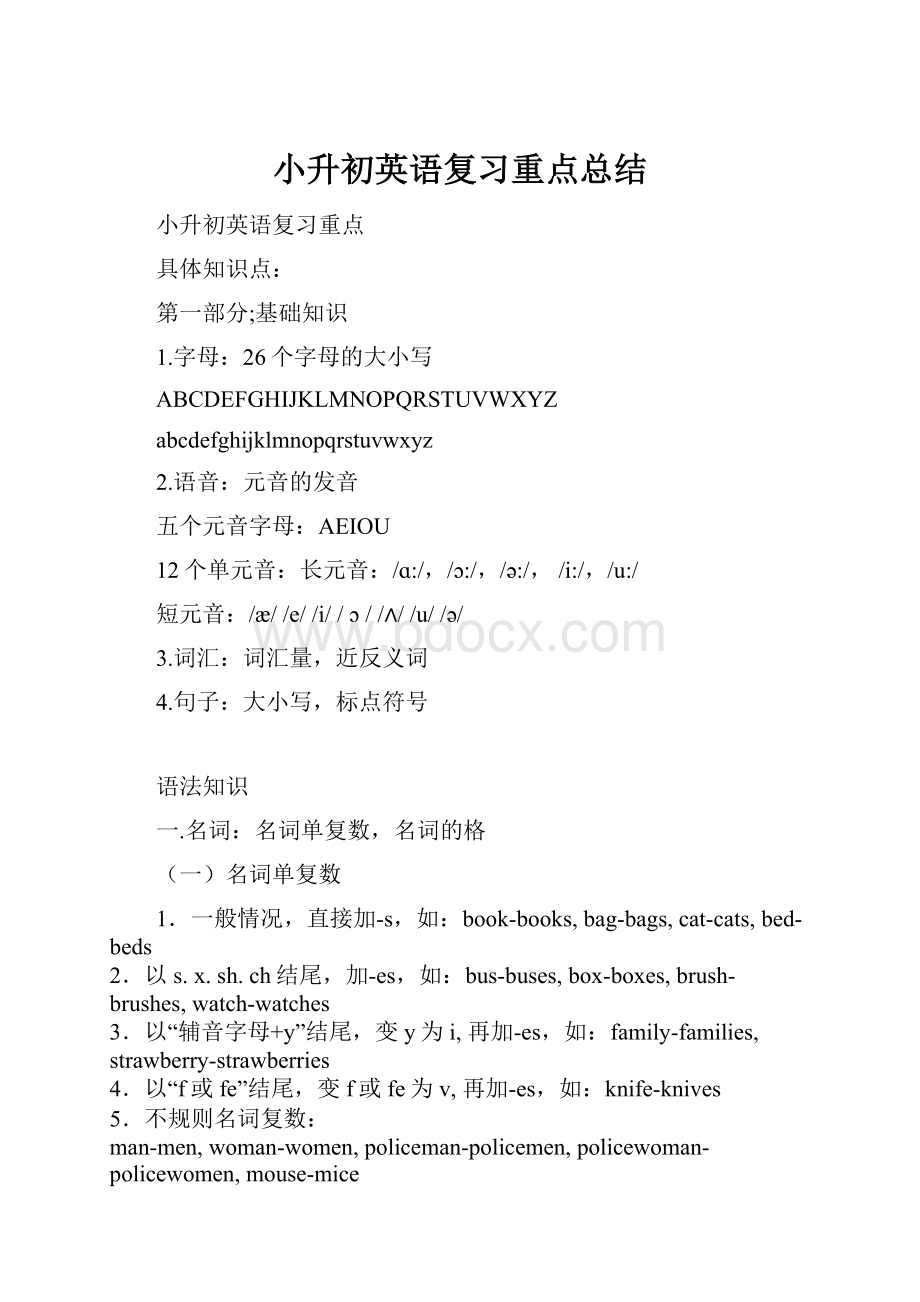小升初英语复习重点总结.docx
《小升初英语复习重点总结.docx》由会员分享,可在线阅读,更多相关《小升初英语复习重点总结.docx(33页珍藏版)》请在冰豆网上搜索。

小升初英语复习重点总结
小升初英语复习重点
具体知识点:
第一部分;基础知识
1.字母:
26个字母的大小写
ABCDEFGHIJKLMNOPQRSTUVWXYZ
abcdefghijklmnopqrstuvwxyz
2.语音:
元音的发音
五个元音字母:
AEIOU
12个单元音:
长元音:
/ɑ:
/,/ɔ:
/,/ə:
/,/i:
/,/u:
/
短元音:
/æ//e//i//ɔ//∧//u//ə/
3.词汇:
词汇量,近反义词
4.句子:
大小写,标点符号
语法知识
一.名词:
名词单复数,名词的格
(一)名词单复数
1.一般情况,直接加-s,如:
book-books,bag-bags,cat-cats,bed-beds
2.以s.x.sh.ch结尾,加-es,如:
bus-buses,box-boxes,brush-brushes,watch-watches
3.以“辅音字母+y”结尾,变y为i,再加-es,如:
family-families,strawberry-strawberries
4.以“f或fe”结尾,变f或fe为v,再加-es,如:
knife-knives
5.不规则名词复数:
man-men,woman-women,policeman-policemen,policewoman-policewomen,mouse-mice
child-children,foot-feet,tooth-teeth,fish-fish,people-people,Chinese-Chinese,Japanese-Japanese
巩固练习
写出下列各词的复数
I_________him_________this___________her______
watch_______child_______photo________diary______
day________foot________book_______dress________
tooth_______sheep______box_______strawberry_____
thief_______bus______peach______sandwich______
man______woman_______knife_______ juice___________
water________milk________rice__________tea__________
(二)名词的格
(1)有生命的东西的名词所有格:
a)单数后加’s如:
Lucy’srulermyfather’sshirt
b)以s结尾的复数名词后加’如:
hisfriends’bags
c)不以s结尾的复数后加’schildren’sshoes
●并列名词中,如果.
●把’s加在最后一个名词后,表示共有,如:
TomandMike’scar汤姆和迈克共有的小汽车
●要表示所有物不是共有的,应分别在并列名词后加’s
Tom’sandMike’scars汤姆和麦克各自的小汽车
(2)表示无生命东西的名词通常用“of+名词”来表示所有关系:
如:
apictureoftheclassroomamapofChina
二.冠词:
不定冠词,定冠词种类:
(1)不定冠词:
a/anaunit/anuncle
元音开头的可数名词前用an:
anegg/anapple/anorange/aneraser/ananswer/anIDcard/analarmclock/anactor/anactress/ane-mail/anaddress/anevent/anexample/anopera/anhouranoldman/aninterestingbook/anexcitingsport/anactionmovie/anartlesson/
(2)定冠词:
thetheeggtheplane
2.用法:
定冠词的用法:
(1)特指某(些)人或某(些)物:
Therulerisonthedesk.
(2)复述上文提到的人或物:
Hehasasweater.Thesweaterisnew.
(3)谈话双方都知道的人或物:
Theboysaren’tatschool.
(4)在序数词前:
John’sbirthdayisFebruarythesecond.
(5)用于固定词组中:
inthemorning/afternoon/evening
不用冠词的情况:
(1)专有名词前:
Chinaisabigcountry.
(2)名词前有定语:
this,that,my,your,some,any,no等:
Thisismybaseball.
(3)复数名词表示一类人和事:
Monkeyscan’tswim.Theyareteachers.
(4)在节日,日期,月份,季节前:
TodayisChristmasDay.It’sSunday.
(5)一日三餐前:
Wehavebreakfastat6:
30.
(6)球类棋类运动前:
Theyoftenplayfootballafterclass.Heplayschessathome.
*但乐器前要用定冠词:
Iplaytheguitarverywell.
(7)学科名称前:
Myfavoritesubjectismusic.
(8)在称呼或头衔的名词前:
ThisisMrLi.
(9)固定词组中:
atnoonatnightbybus
三、代词:
人称代词,物主代词
主格
宾格
形容词性物主代词
名词性物主代词
第一
人称
单数
I(我)
me
my(我的)
mine我的...
复数
we(我们)
us
our(我们的)
ours我们的...
第二
人称
单数
you(你)
you
your(你的)
yours你的...
复数
you(你们)
you
your(你们的)
yours你们的...
第三
人称
单数
he(他)
him
his(他的)
his他的...
she(她)
her
her(她的)
hers她的...
it(它)
it
its(它的)
its它的...
复数
they(他们/她们/它们)
them
their(他们的/她们的/它们的)
theirs他们的/她们的
/它们的...
.用所给词的适当形式填空
1. Thatisnot_________kite.Thatkiteisverysmall,but_________isverybig. (I)
2. Thedressis_________.Giveitto_________.(she)
3. Isthis_________watch?
(you)No,it’snot_________.(I)
4. _________ismybrother._________nameisJack.Look!
Thosestampsare_________.(he)
5. _________dressesarered.(we)Whatcolourare_________?
(you)
6. Herearemanypens,whichoneis_________?
(she)
7. Icanfindmytoy,butwhere’s_________?
(you)
8. Give_________yourkite,OK?
(they)
9. Ihaveabeautifulcat._________nameisMimi.Thesecakesare_________.(it)
10. Arethese_________balls?
No,_________arenot_________._________aren’there.(they)
11. Ihavealovelybrother._________isonly3.Ilike_________verymuch.(he)
12. _________ismyaunt.Doyouknow_________job?
_________anurse.(she)
13. Thatisnot_________phone._________isathome.(he)
14. Whereare_________?
Ican’tfind_________.Let’scall_________parents.(they)
15. _________sisterisill.Pleasegoandsee_________.(she)
16. _________don’tknowhername.Wouldyoupleasetell_________.(we)
四、形容词,副词:
比较级,最高级
(一)、形容词的比较级
1、形容词比较级在句子中的运用:
两个事物或人的比较用比较级,比较级后面一般带有单词than。
比较级前面可以用more,alittle来修饰表示程度。
than后的人称代词用主格(口语中可用宾格)。
2.形容词加er的规则:
⑴一般在词尾加er;
⑵以字母e结尾,加r;
⑶以一个元音字母和一个辅音字母结尾,应双写末尾的辅音字母,再加er;
⑷以“辅音字母+y”结尾,先把y变i,再加er。
3.不规则形容词比较级:
good-better,beautiful-morebeautiful
(二)副词的比较级
1.形容词与副词的区别(有be用形,有形用be;有动用副,有副用动)
⑴在句子中形容词一般处于名词之前或be动词之后
⑵副词在句子中最常见的是处于实义动词之后
2.副词比较级的变化规则基本与形容词比较级相同(不规则变化:
well-better,far-farther)
一、写出下列形容词或副词的比较级
old__________ young________ tall_______ long________
short________ strong________ big________ small_______
fat_________ thin__________ heavy______ nice_________early_________
二、根据句意填入单词的正确形式:
1.Mybrotheristwoyears__________(old)thanme.
2.Isyoursister__________(young)thanyou?
Yes,sheis.
3.Whois___________(thin),youorHelen?
Helenis.
4.Whosepencil-boxis__________(big),yoursorhers?
Hersis.
5.Ben______(jump)________(high)thansomeoftheboysinhisclass.
6.Myeyesare__________(big)than________(she)..
7.Whichis___________(heavy),theelephantorthepig?
8.Whogetsup_________(early),TimorTom?
9._____thegirlsgetup_______(early)thantheboys?
No,they______.
10.Jimruns_____(slow).ButBenruns_____(slow).
三、翻译句子:
1、谁比Jim年纪大?
________is_________thanJim?
2、-谁比David更强壮?
-是GaoShan.
-________ _________thanDavid?
-GaoShan________.
3、谁的铅笔更长,他的还是她的?
我想是她的。
_________pencilis_________,______or________?
________is,Ithink.
4.我的姐姐起得比我早。
My_____ _____up_____thanme.
五数词:
基数词,序数词一、基数词
(1)1-20
one,two,three,four,five,six,seven,eight,nine,ten,eleven,twelve,thirteen,fourteen,fifteen,sixteen,seventeen,eighteen,nineteen,twenty
(2)21-99先说“几十”,再说“几”,中间加连字符。
23→twenty-three,34→thirty-four,45→forty—five,56→fifty-six,67→sixty-seven,78→seventy-eight,89→eighty-nine,91→ninety-one
(3)101—999先说“几百”,再加and,再加末两位数或末位数;
586→fivehundredandeighty-six,803→eighthundredandthree
(4)l,000以上,先从右往左数,每三位数加一个“,”,第一个“,”前为thousand.第二个“,”前为million,第三个“,”前为billion
1,001→onethousandandone
18,423→eighteenthousand,fourhundredandtwenty-three
6,260,309→sixmilliontwohundredandsixtythousandthreehundredandnine
750,000,000,000→sevenhundredandfiftybillion
二、序数词
(1)一般在基数词后加th
eg.four→fourth,thirteen→thirteenth
(2)不规则变化
one→first,two→second,three→third,five→fifth,eight→eighth,nine→ninth,twelve—twelfth
(3)以y结尾的十位整数,变y为ie再加th
twenty→twentieth,forty→fortieth,ninety→ninetieth
(4)从二十一后的“几十几”直至“几百几十几”或“几千几百几十几”只将个位的基数词变为序数词。
twenty-first,twohundredandforty-fifth
基数词转为序数词的口诀:
基变序,有规律,词尾加上-th.
一,二,三,特殊记,词尾字母t,d,d.
八去t,九去e,ve要用f替。
ty将y变成i,th前面有个e.
若是碰到几十几,前用基来后用序。
6、介词:
常用介词:
in,on,at,behind等
1.at表示时间概念的某一个点。
(在某时刻、时间、阶段等)。
at1:
00(dawn,midnight,noon)在一点钟(黎明、午夜、中午)
2.on
1)表示具体日期。
注:
(1)关于"在周末"的几种表示法:
at(on)theweekend在周末---特指
at(on)weekends在周末---泛指
overtheweekend在整个周末
duringtheweekend在周末期间
(2)在圣诞节,应说atChristmas而不说onChristmas
2)在(刚……)的时候。
Onreachingthecityhecalleduphisparents.
一到城里他就给父母打了一个电话。
3.in
1)表示"时段"、"时期",在多数情况下可以和during互换,前者强调对比,后者强调持续。
in(during)1988(December,the20thcentury)在一九八八年(十二月、二十世纪)
七、动词:
动词的四种时态:
(1)一般现在时:
一般现在时的构成
1.be动词:
主语+be(am,is,are)+其它。
如:
Iamaboy.我是一个男孩。
2.行为动词:
主语+行为动词(+其它)。
如:
WestudyEnglish.我们学习英语。
当主语为第三人称单数(he,she,it)时,要在动词后加"-s"或"-es"。
如:
MarylikesChinese.玛丽喜欢汉语。
动词+s的变化规则
1.一般情况下,直接加-s,如:
cook-cooks,milk-milks
2.以s.x.sh.ch.o结尾,加-es,如:
guess-guesses,wash-washes,watch-watches,go-goes
3.以“辅音字母+y”结尾,变y为i,再加-es,如:
study-studies
一、写出下列动词的单三形式
wash_________watch_______study______finish_________go________study_________stop______be________teach______fly_____stay_______do______have_______
二、.用动词的适当形式填空
1.Ilike____________(swim).2.He_________(read)Englisheveryday.
3.We______(go)toschoolatseveninthemorning.
4.Mike_______(go)toschoolatseveninthemorning.
5.Mymother_______(like)______(go)shopping.
6.Ican________(draw)manybeautifulpictures.
7.he________(like)_________(jump)?
8.Theteachers(notlike)__________(dance).
9.Theteacher(notlike)_________(dance).
10.Thestudents___________(speak)Englishinclass.
11.Thestudent_________(speak)Chineseafterclass.
12._______yoursister(study)Englishatschool?
No,she__________.(not)
三、用所给的人称改写句子
1.ItakephotosonSunday.(Mike)
2.Weplantbeautifulflowers.(she)
3.Theylikeplayingbasketball.(Ben)
4.Ilistentomusiceveryday.(myaunt)
四、改句子
1.Doyouoftenplayfootballafterschool?
(肯定回答)
2.GaoShan'ssisterlikesplayingtabletennis(改为否定句)
3.ShelivesinasmalltownnearNewYork.(改为一般疑问句)
4.IwatchTVeveryday.(改为一般疑问句)
5.Nancydoesn'trunfast.(肯定句)
6.IusuallyplayfootballonFridayafternoon.(否定句:
一般疑问句:
划线提问)
●SuYangusuallywashessomeclothesonSaturday.(同11)
●Tomdoeshishomeworkathome.(同11)
(2)一般过去时:
动词过去式详解动词的过去式的构成规则有:
A、规则动词
① 一般直接在动词的后面加ed:
如 worked,learned,cleaned,visited
② 以e结尾的动词直接加d:
如 lived,danced,used
③ 以辅音字母加y结尾的动词要改y为i再加ed(此类动词较少)如 study–studiedcarry–carriedworry–worried(注意play、stay不是辅音字母加y,所以不属于此类)
④双写最后一个字母(此类动词较少)如 stopped
B、不规则动词(此类词并无规则,须熟记)小学阶段要记住以下动词的原形和过去式:
sing–sang,eat–ate,
see–saw,have–had,do–did,go–went,take–took,buy–bought,get–got,read–read,fly–flew,am/is–was,
are–were,say–said,leave–left,swim–swam,tell–told,draw–drew,come–came,lose–lost,find–found,drink–drank,hurt–hurt,feel–felt
一、写出下列动词的过去式
is\am_________